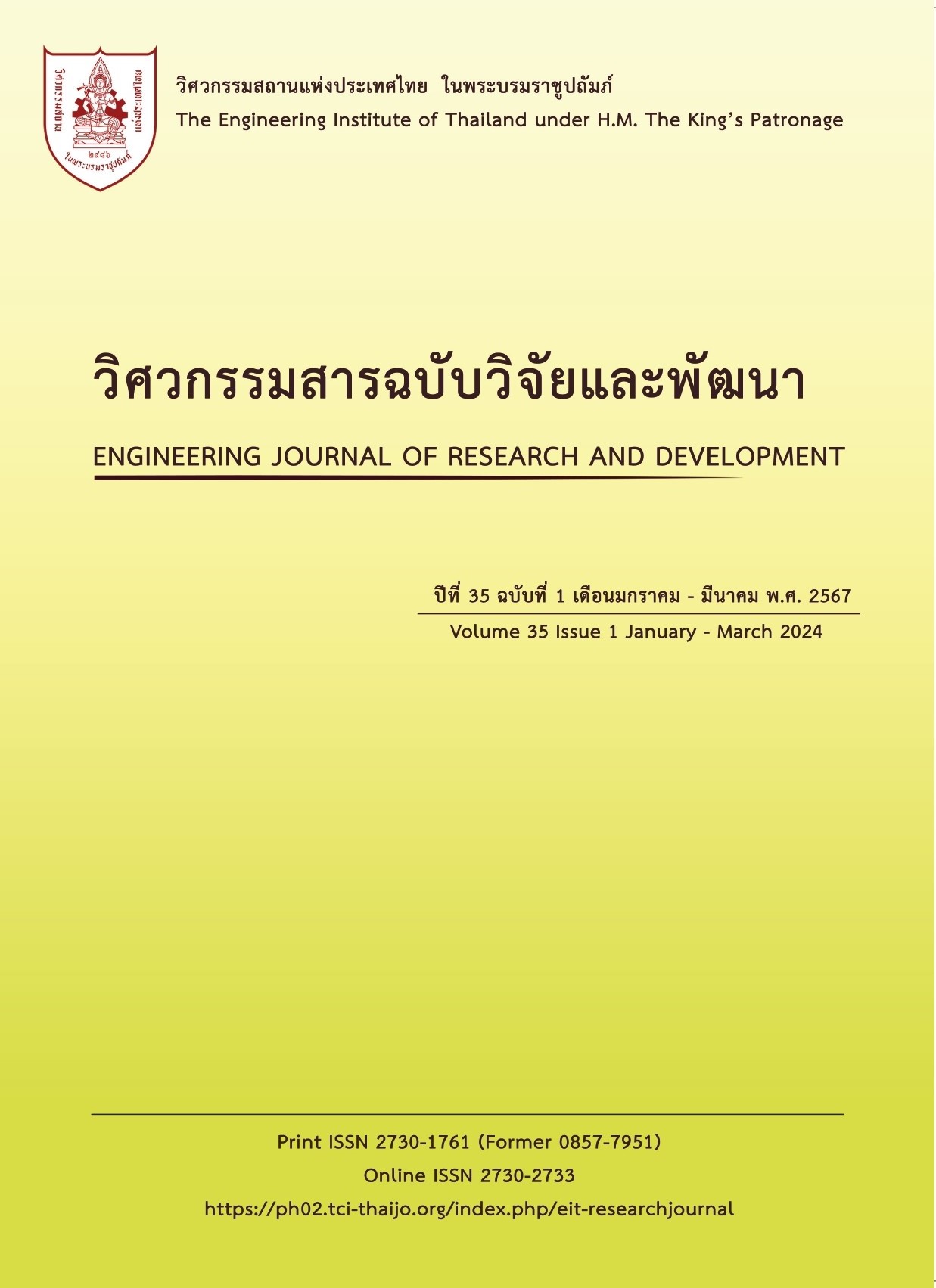ปัจจัยความสำเร็จของโครงการก่อสร้างรถไฟฟ้าประเภทรางขนาดใหญ่
Main Article Content
บทคัดย่อ
โครงการก่อสร้างรถไฟฟ้าประเภทรางขนาดใหญ่ เป็นโครงการก่อสร้างโครงสร้างพื้นฐาน (Infrastructure) ที่มีความซับซ้อน และใช้งบประมาณสูง มีบุคลากรที่เกี่ยวข้องกับการก่อสร้างหลายฝ่าย และมีปัจจัยที่ส่งผลต่อความสำเร็จที่ผู้บริหารโครงการต้องให้ความสำคัญในหลาย ๆ ด้าน งานวิจัยนี้มีวัตถุประสงค์เพื่อศึกษาปัจจัยความสำเร็จในโครงการก่อสร้างรถไฟฟ้าและเปรียบเทียบปัจจัยที่เกิดขึ้นในรูปแบบสัญญาออกแบบควบคู่การก่อสร้าง (Design-Build) และสัญญาออกแบบ-ประมูล-ก่อสร้าง (Design-Bid-Build) หรือ (Detailed Design) โดยงานวิจัยนี้เป็นงานวิจัยเชิงคุณภาพใช้การเก็บข้อมูลโดยการสัมภาษณ์ความคิดเห็นของเจ้าของโครงการจำนวน 13 คน โดยผู้วิจัยได้ทำการตรวจสอบคุณภาพของเครื่องมือก่อนเก็บข้อมูลและได้ทำการจำแนกและตรวจสอบถึงความอิ่มตัวของข้อมูล (Data Saturation) หลังการเก็บข้อมูลโดยการตรวจสอบด้วยวิธีวิธีสามเส้า (Triangulation) เพื่อให้เกิดความแม่นยำและสอดคล้องกับวัตถุประสงค์ในงานวิจัย จากผลการวิจัยพบว่า ปัจจัยความสำเร็จที่พบในโครงการก่อสร้างรถไฟฟ้าประเภทรางขนาดใหญ่ ประกอบด้วยปัจจัยทั้งหมด 45 ปัจจัย โดยปัจจัยดังกล่าวเกิดขึ้นในแต่ละช่วงวัฏจักรโครงการ (Project Life Cycle) ที่แตกต่างกัน ส่วนสุดท้ายของงานวิจัยที่ได้ศึกษาเปรียบเทียบรูปแบบของสัญญา Design-Build และสัญญา Design-Bid-Build พบว่า ปัจจัยส่วนใหญ่ที่นำไปสู่ความสำเร็จของการก่อสร้างโครงการรถไฟฟ้าประเภทรางขนาดใหญ่ ไม่มีความแตกต่างกันในแต่ละรูปแบบของสัญญา
Article Details

อนุญาตภายใต้เงื่อนไข Creative Commons Attribution-NonCommercial-NoDerivatives 4.0 International License.
บทความที่ได้รับการตีพิมพ์เป็นลิขสิทธิ์ของวารสารวิศวกรรมสารฉบับวิจัยและพัฒนา วิศวกรรมสถานแห่งประเทศไทย ในพระบรมราชูปถัมภ์
เอกสารอ้างอิง
พุทธชาด ลานคำ. แนวโน้มธุรกิจ/อุตสาหกรรม ปี 2565-2567 : ธุรกิจรับเหมาก่อสร้าง, 2565.
Project Management Institute. Project Management Body of Knowledge, 2004.
ณรงค์ เหลืองบุตรนาค. การบริหารงานก่อสร้าง Construction Management, 2557, พิมพ์ครั้งที่ 1.
สมาคมพีเอ็มไอ แชพเตอร์ ประเทศไทย. A GUIDE TO THE PROJECT MANAGEMENT BODY OF KNOWLEDGE คู่มือแนวทางเกี่ยวกับองค์ความรู้ในการบริหารโครงการ, 2557, พิมพ์ครั้งที่ 1.
,14] สุทธิ ภาษีผล. องค์ประกอบแสดงความสำเร็จของโครงการ. CPAC NEW, 2555, ฉบับที่ 1 มกราคม-มีนาคม.
Pinto, J. & Slevin, D. Critical Success Factors across the Project Life Cycle. Project Management Journal, 1988.
https://www.researchgate.net/publication/236175751
Albert, C., David, S., and Ada, C., Factors Affecting the Success of a Construction Project. American Society of Civil Engineers Journal, 2004, 130 (1), pp.153-155. https://doi.org/10.1061/(ASCE)0733-9364(2004)130:1(153)
,13] Chan, A. Scott, D. & Chan, A. Factors Affecting the Success of a Construction Project. American Society of Civil Engineers Journal, 2004, (130). https://ascelibrary.org/doi/abs/10.1061/(ASCE)0733-9364(2004)130:1(153)
ณัฐชัย สุนทรพิพิธ. กรณีศึกษาปัจจัยที่มีอิทธิพลต่อความสำเร็จของโครงการก่อสร้างรถไฟฟ้าใต้ดิน [การศึกษาโครงการเฉพาะเรื่องปริญญามหาบัณฑิต ไม่ได้ตีพิมพ์]. มหาวิทยาลัยเทคโนโลยีพระจอมเกล้าธนบุรี, 2546.
ชัยชนะ ชิดช่วงชัย, สุธาริน สถาปิตานนท์ และวิโรจ รุโจปการ. ปัจจัยที่มีผลต่อความสำเร็จของโครงการก่อสร้างขนาดใหญ่ [Paper], การประชุมวิชาการของมหาวิทยาลัยเกษตรศาสตร์ ครั้งที่ 56, กรุงเทพฯ, ประเทศไทย, 2560.
เอื้อมพร หลินเจริญ. การวิเคราะห์และนำเสนอผลในงานวิจัยเชิงคุณภาพ. พิษณุโลก : มหาวิทยาลัยนเรศวร, 2562.
Greg, G. & Emily, N. A simple method to assess and report thematic saturation in qualitative research, PLOS ONE, 2020, 15 (5).


